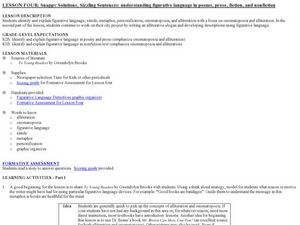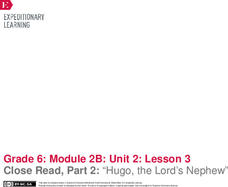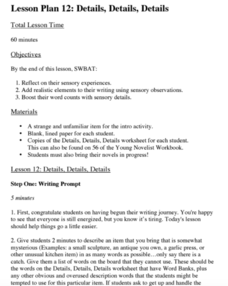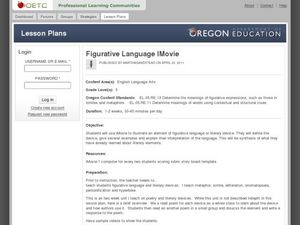Curated OER
Similes and Metaphors
Students use similes and metaphors to enhance their creative writing. In this creative writing worksheet, students learn the definitions of and differences between similes and metaphors. They practice making similes using the list given...
Curated OER
Lots of Lessons from Aesop
Aesop’s Fables offer young learners an opportunity to study figurative language. After reviewing theme, simile, alliteration, and metaphor, model for your pupils how to identify examples of these devices in the fable. Class members then...
Curated OER
Coming Home:From the Life of Langston Hughes
Third graders listen to the non-fiction book: COMING HOME: FROM THE LIFE OF LANGSTON HUGHES. They identify examples of metaphors and similies within the book and understand how this figure of speech is used in writing. They then create...
Curated OER
Deciphering the Mechanics of Poetry
After a review of poetic terms, groups are given an object and they create a poem using a simile, a metaphor, internal rhyme, end rhyme, alliteration, and personification. Groups then exchange objects and repeat the process. Consider...
Curated OER
It's Raining Cats and Dogs! Literary Devices and Figurative Language
Third and fourth graders study literary devices and figurative language. They view a PowerPoint presentation (which you must create) to review hyperbole, idiom, simile, and metaphor. They read and discuss the book There's A Frog in My...
Curated OER
Poetry: Simile And Figurative Language
Students explore websites that contain poems about autumn, winter, and the seasonal holidays and explore how similes and figurative language can be used in poetry.
Curated OER
Figurative Language Academy Awards
Students examine figurative language in writing. Students demonstrate simile, metaphor, and personification in their own writing.
Curated OER
Snappy Solutions, Sizzling Sentences
An examination of the figurative language in Gwendolyn Brooks’ To Young Readers challenges your writers to think about the richness of language. Ask your class why Brooks says, “Good books are bandages.” This discussion of alliteration,...
National Park Service
The Poet's Toolbox
If you need a lesson plan for your poetry unit, use two poems by Henry Wadsworth Longfellow ("Rain in Summer" and "The Slave in the Dismal Swamp") and a resource on Elements of Poetry. The lesson plan guides you through activities on...
Curated OER
Identifying Figurative Language
Students explore figurative language. For this Fahrenheit 451 lesson, students read the Bradbury novel. As they read, students note the simile, metaphor, and personification examples that they encounter.
Curated OER
Haiku Wrap Up
Students create a haiku about the land formations they've studied. In this haiku lesson, students identify the metaphor and meaning of a given haiku, brainstorm comparisons for a landform photo as a class and choose one to use in a...
EngageNY
Close Read, Part 2: “Hugo, the Lord’s Nephew”
No, not literally. Scholars read Hugo, the Lord’s Nephew to compare figurative and literal language. Readers learn about simile, metaphor, personification, and idioms with a graphic organizer. Pupils then answer text-dependent questions...
Curated OER
Poetry in Music
Sixth graders look at poetry in music. In this language arts lesson, 6th graders listen to and read the lyrics of songs to find the poetic aspects of them. They focus on similes and metaphors and write their own songs lyrics.
Curated OER
Can You Figure Language?
Eighth graders study similes and metaphors and how to explain and create them. After a lecture/demo, 8th graders access websites and worksheets imbedded in this plan to create their own writing.
Curated OER
Comparatively Speaking
Students practice creating similes and metaphors together as a class. Individually students create similes and metaphors and illustrate them.
Curated OER
Language Arts: Stylistic Devices
Young scholars are able to define given literary terms, such as metaphor, simile, imagery, personification, symbolism, etc. They are able to identify the use of literary elements in a given text. Students are able to interpret weather...
Curated OER
Similes, Metaphors, and Symbols
Here is an outline of a lesson plan in which learners examine the use of similes, metaphors, and symbols in poetry. They define similes, metaphors, and symbols, complete a handout, and create a poem using types of figurative language.
Curated OER
Details, Details, Details
Writing can become one-dimensional if authors don't involve all their senses. First, scholars observe a strange object which, ideally, they can touch and even smell. Without using certain words (you can create a list or have the class...
Curated OER
A Simile and Metaphor Lesson
Students use their knowledge of similes and metaphors to analyze poetry. In this poetry and language lesson plan, students read examples of similes and metaphors and write their own examples that describe their city, television, or an...
Curated OER
Similes and Metaphors
Students explore similes and metaphors. They discuss and define similes and metaphors, identify the similes and metaphors in two poems, and create three original examples of each.
Curated OER
Figurative Language
What is figurative language, and why do we use it? Introduce your high schoolers to some examples and discuss the importance of including this element in your writing. After studying a text and searching for examples, writers will...
Curated OER
Figurative Language iMovie
In order to understand figurative language, learners read 5 poems, each exemplifying a different literary device. They discuss and write responses to each poem. They then choose one literary device which they will use as the basis for a...
Academy of American Poets
Teach This Poem: "Spring is like a perhaps hand" by E. E. Cummings
E. E. Cummings' "Spring is like a perhaps hand" offers young scholars an opportunity to try their hands at analyzing a simile. After a warm-up activity and a close reading of the poem, class members discuss what they think the poem is...
Curated OER
History According to Shakespeare
Learners read Shakespeare's, Julius Caesar while identifying a number of literary elements including simile, metaphor, personification, and hyperbole. As a response activity, they simulate a mock trial, and finally, compare and contrast...
Other popular searches
- Simile Metaphor Worksheet
- Metaphor Simile
- Metaphor and Simile
- Metaphor Simile Onomatopoeia
- Simile and Metaphor Poems
- Metaphor Simile Owl Moon
- Winter Simile and Metaphors
- Metaphor Simile 3rd Grade
- Simile Metaphor Sheets
- Simile Metaphor Idiom
- Metaphors and Simile
- Simile Metaphor Poetry

























